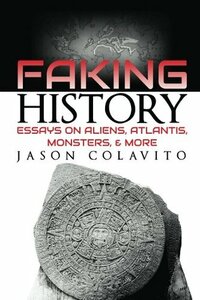Take a photo of a barcode or cover
informative
reflective
medium-paced
FAKING HISTORY is a collection of essays on (pseudo-)history and (pseudo-)archaeology, often on the theme of Erich von Daniken's CHARIOTS OF THE GODS? and related "ancient astronaut" nonsense but digressing into other things, like "Lost Tribe" pseudo-anthropology "proving" that Native Americans weren't the first human population in the New World (because Bible and racism); Afrocentrism proving that Africa did everything first; and so on. I remember enjoying this a lot more back in 2014, but I think it's because I lacked perspective. There are better, meatier works of skeptical inquiry out there, and this book is a collection of blog posts and popular articles.
That means Colavito spends a lot of time ridiculing the various "researchers" (and to be sure, they are ridiculous) and little time laying out the scholarly consensus - those times he does this are the clear winners of the collection. A valuable theme to take away is the cyclic nature of pseudo-scholarship: many of these "theories" can be traced back to a single source, misreading, misinterpretation, hoax, fraud, etc., with all future iterations flowing outward from it. Pseudo-scholarship is, if nothing else, lazy. The best overall chapters are Colavito's own argument that the entire "ancient astronaut theory" (specifically that physical aliens visited earth in the distant past and physically influenced the mostly non-European human societies) was derived from the fiction of H. P. Lovecraft via some guys in France (who were then shamelessly plagiarized by Erich von Daniken).
2 stars; not compelling enough for newbies, not meaty enough for the informed reader of skeptical literature. Though maybe I'm being too harsh, since neither L. Sprague de Camp's LOST CONTINENTS nor (especially!) Clifford A. Wilson's CRASH GO THE CHARIOTS were particularly scholarly in their treatment. (The gold standard there is still THE BERMUDA TRIANGLE MYSTERY---SOLVED!)
That means Colavito spends a lot of time ridiculing the various "researchers" (and to be sure, they are ridiculous) and little time laying out the scholarly consensus - those times he does this are the clear winners of the collection. A valuable theme to take away is the cyclic nature of pseudo-scholarship: many of these "theories" can be traced back to a single source, misreading, misinterpretation, hoax, fraud, etc., with all future iterations flowing outward from it. Pseudo-scholarship is, if nothing else, lazy. The best overall chapters are Colavito's own argument that the entire "ancient astronaut theory" (specifically that physical aliens visited earth in the distant past and physically influenced the mostly non-European human societies) was derived from the fiction of H. P. Lovecraft via some guys in France (who were then shamelessly plagiarized by Erich von Daniken).
2 stars; not compelling enough for newbies, not meaty enough for the informed reader of skeptical literature. Though maybe I'm being too harsh, since neither L. Sprague de Camp's LOST CONTINENTS nor (especially!) Clifford A. Wilson's CRASH GO THE CHARIOTS were particularly scholarly in their treatment. (The gold standard there is still THE BERMUDA TRIANGLE MYSTERY---SOLVED!)

